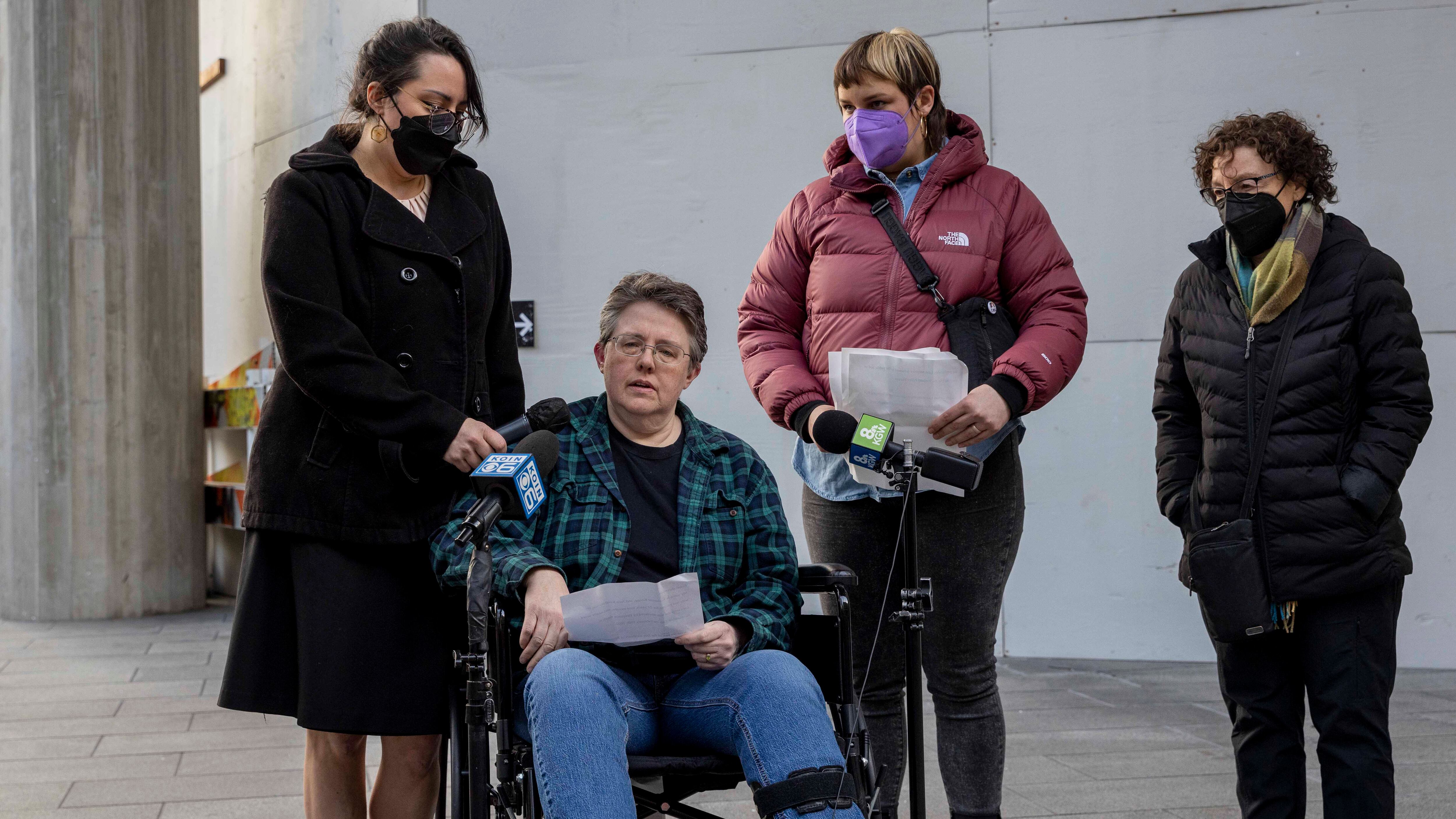NORMANDALE PARK KILLER GETS LIFE SENTENCE: Benjamin Smith, the man who murdered a woman and shot four others near Normandale Park in Northeast Portland last year, has been sentenced to life in prison, with the possibility of parole after 55 years. Multnomah County Circuit Judge Christopher Marshall announced the decision April 18. Smith pleaded guilty earlier this month. Several of Smith’s victims made statements at the sentencing, and one, Dajah Beck, played recorded footage of the attack in court. “Every victim here today is someone who would run towards the sound of gunfire to help someone—but that night, at that intersection, the gunfire came to us,” she said. On Feb. 19, 2022, Smith shot longtime activist June Knightly, 60, in the head, killing her as she was helping to direct traffic during a racial justice march. Smith shot four other people before being shot himself by a bystander. One of his victims was paralyzed from the neck down. Smith lived near the park and had been previously reported to local and federal law enforcement for his threatening behavior prior to the shootings.
FENTANYL DEALING PERSISTS AT WASHINGTON CENTER: Less than a week after Portland police and fire personnel cleared the Washington Center complex, and the Menashe real estate family boarded it up, drug dealers and users returned to the one part of the building that still affords protection from the rain: the covered plaza outside the former KeyBank at Southwest 5th Avenue and Washington Street. About a dozen people were gathered there on April 17, smoking fentanyl as spring rains drenched downtown. Police and fire cleared the building for the Menashes in exchange for a guarantee they would seal the building. Cody Bowman, a spokesman for Mayor Ted Wheeler, didn’t return emails seeking comment on whether the Menashes had done enough by putting up plywood. “We will continue to do whatever is necessary for safety and security,” says Barry Menashe, founder of Menashe Properties. Spokeswoman Terri Wallo-Strauss says Portland police have discontinued round-the-clock patrols of the sidewalks around the building, which teemed with drug dealers and users until a week ago, when police started the patrols. “We continue to have a presence in the area, and our bike squad is active throughout downtown,” Wallo-Strauss says. “But we do not have a dedicated patrol at 4th and Washington 24/7.”
TOP REPUBLICANS ASK KOTEK FOR INDEPENDENT LA MOTA INVESTIGATION: On April 17, Republican leaders, including Senate Minority Leader Tim Knopp (R-Bend) and House Minority Leader Vikki Breese-Iverson (R-Prineville), sent a letter to Gov. Tina Kotek demanding that she hire outside counsel to probe the Oregon Liquor and Cannabis Commission and its relationship with La Mota, the state’s second-largest cannabis dispensary chain whose tax liens and legal troubles were outlined in a cover story last month (“Strange Budfellows,” WW, March 29). The OLCC continued to grant La Mota licenses despite millions in state and federal tax liens issued over the past five years to its founders, Rosa Cazares and Aaron Mitchell, and the companies they control. It’s an uncomfortable spot for the governor: Cazares, Mitchell, La Mota, and a political action committee controlled by Cazares contributed more than $70,000 to Kotek’s gubernatorial campaign. The couple also hosted an intimate house party for Kotek last spring and a black-tie gala for her last fall. Kotek has previously said she won’t ask for La Mota to be wrapped into an existing OLCC investigation. She did not respond to the GOP leaders’ letter.
CITIES AND COUNTY RESPOND TO KOTEK’S DEMANDS ON HOMELESSNESS PLAN: Gov. Tina Kotek last week rejected the application submitted by the cities of Portland and Gresham and Multnomah County for their share of $200 million in emergency funding for homelessness, saying it was incomplete and lacked detail. “I was disappointed,” Kotek said April 10 of the Portland-Gresham-Multnomah County plan. “They need to get their stuff together.” That disappointment carried dire consequences: Without more information, the jurisdictions would get no money. That got local officials’ attention; they submitted a revised application April 13 that included specifics about how they would rehouse 275 families and create another 140 shelter beds. “I appreciate the county chair, the mayor of Portland, and their staff for collaborating on these revisions to ensure emergency funds will be used to meet specific goals in our shared mission to reduce homelessness,” Kotek said April 17. “Oregonians are demanding accountability, and this was an important step forward in our work to deliver results.”
DEMOCRATIC SENATOR’S HEALTH ISSUES LOOM: The health of state Sen. Chris Gorsek (D-Troutdale) is a big question mark as the legislative session passes the halfway point. Gorsek, who is co-chair of the Legislature’s Joint Transportation Committee, underwent unplanned open-heart surgery March 20 and has been absent since then. Gorsek’s committee faces contentious and consequential decisions on two megaprojects: the expansion of Interstate 5 through the Rose Quarter and the replacement of the Interstate Bridge. Critics of the Oregon Department of Transportation’s plans for both are feeling Gorsek’s absence. His co-chair, Rep. Susan McLain (D-Hillsboro), is less skeptical of the projects than Gorsek. Senate President Rob Wagner (D-Lake Oswego) has not named a temporary co-chair to fill in for Gorsek. Advocates also speculate that Senate Bill 611, a tightening of an existing rent control law, could be in trouble without Gorsek (one of 17 Senate Democrats). “Sen. Gorsek plans to return before the end of session,” says Senate Democratic spokeswoman Tess Seger. “As with any recovery, there is always uncertainty, but he is feeling good and hopes to be back soon.”

